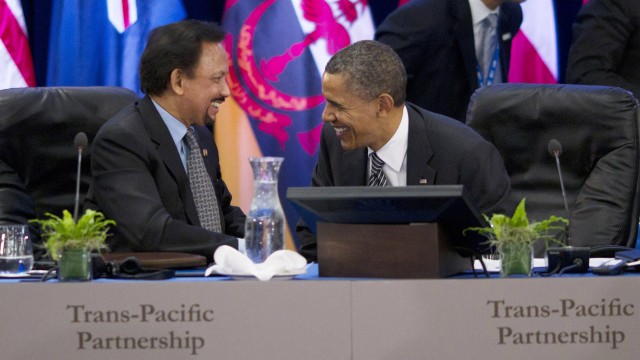
Another chapter in the tale of the Trans-Pacific Partnership (TPP) — a secret international trade deal being pushed by the Obama administration and described by critics as “NAFTA on steroids” — has once again been Wikileaked. This one deals with the environment, and it shows that, by and large, the US is caving on environmental standards it had previously set for international trade agreements.
Environmental groups say the protections that are included in the document are weak — and, furthermore, that the pact contains no enforcement mechanisms. This breaks with recent precedent — in 2007, Bush reached an agreement with congressional Democrats that required environmental provisions in trade agreements to be legally binding.
“The lack of fully-enforceable environmental safeguards means negotiators are allowing a unique opportunity to protect wildlife and support legal sustainable trade of renewable resources to slip through their fingers,” said Carter Roberts, president and CEO of the World Wildlife Fund. “These nations account for more than a quarter of global trade in fish and wood products and they have a responsibility to address trade’s impact on wildlife crime, illegal logging and overfishing.”
The TPP is a deal negotiated by the US, New Zealand, Singapore, Chile, Brunei, Australia, Vietnam, Peru, Malaysia, Canada, Mexico and Japan. The complete text has not been released to the public, but the Obama administration is rushing to get it finalized as part of a strategic “pivot to Asia.” The agreement had previously been criticized for increasing corporate control over the Internet, copyrights and patents and potentially having the same negative effect on the US job market as NAFTA, the North American Free Trade Agreement entered into 20 years ago.
The administration has billed the environmental chapter of TPP as a counter to the agreement’s extensive corporate privileges, but after reading the newly leaked document, environmental groups said it would be ineffectual. “If the environment chapter is finalized as written in this leaked document, President Obama’s environmental trade record would be worse than George W. Bush’s,” said Michael Brune, executive director of the Sierra Club. “This draft chapter falls flat on every single one of our issues — oceans, fish, wildlife and forest protections — and in fact, rolls back the progress made in past trade pacts.”
The leaked documents show that other countries involved in the treaty have resisted the the environmental provisions pushed by the US. Coral Davenport writes at The New York Times:
The documents consist of the environmental chapter as well as a “Report from the Chairs,” which offers an unusual behind-the-scenes look into the divisive trade negotiations, until now shrouded in secrecy. The report indicates that the United States has been pushing for tough environmental provisions, particularly legally binding language that would provide for sanctions against participating countries for environmental violations. The United States is also insisting that the nations follow existing global environmental treaties.
But many of those proposals are opposed by most or all of the other Pacific Rim nations working on the deal, including Australia, New Zealand, Canada, Mexico, Chile, Japan, Singapore, Malaysia, Brunei, Vietnam and Peru. Developing Asian countries, in particular, have long resisted outside efforts to enforce strong environmental controls, arguing that they could hurt their growing economies.
Senate majority leader Harry Reid has said a bill to fast-track the TPP won’t move anytime soon.
“There’s a lot of controversy on that, and I’m going to see how that plays out with my caucus and the Senate,” Reid told reporters.
For more on the TPP, watch Bill’s interview with economist Dean Baker and financial expert Yves Smith, read Joshua Holland’s Q&A with trade expert Lori Wallach or read Baker’s analysis of another leaked chapter of the TPP agreement.


